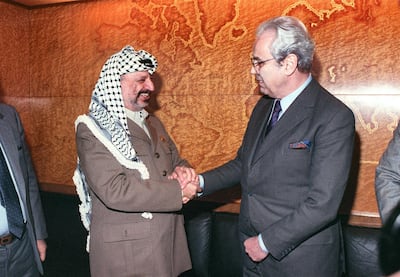Live updates: Follow the latest on Israel-Gaza
Israel's continuing war in Gaza has revived the international push to recognise Palestine as a separate state.
The Palestinian territories are currently occupied by Israel, which controls most of the occupied West Bank, including East Jerusalem, and is currently fighting a war against Hamas in Gaza.
While many countries have long-recognised Palestinian statehood, most in line with their support for a two-state solution to the Israeli-Palestinian conflict, others including the US do not.
However, that balance now appears to be shifting.
On Wednesday, Spain, Norway and Ireland said they will officially recognise Palestine's statehood, effective from May 28.
Norway's Prime Minister Jonas Gahr Store said the move was the “only alternative” to war that offers a political solution “for Israelis and Palestinians alike”.
“Two states, living side by side, in peace and security,” he said.
He reiterated the popular notion that a Palestine state is a “prerequisite” for peace in the region.
Here is a breakdown of which countries recognise Palestinian statehood.
When was a Palestinian state first recognised?
In 1988, Palestinian leader Yasser Arafat unilaterally declared a state of Palestine, with himself as President, nearly 25 years after the establishment of the Palestinian Liberation Organisation, which he chaired.
Mr Arafat adopted the Palestinian Declaration of Independence, which was written by Palestinian poet Mahmoud Darwish.
The declaration's significance lies in its definition of the borders of Palestine according to the British Mandate – which includes the whole of Israel, the West Bank and the Gaza Strip.
That same year, 83 countries recognised Palestine's statehood.
These included most of the Arab world, including the UAE, Bahrain, Egypt, Jordan, Kuwait and Saudi Arabia.
The Soviet Union, China, India and Turkey were among the other major countries to recognise Palestine that year.
However, the US and most western countries refused to recognise Palestine.

Which European countries recognise Palestine?
Spain, Norway and Ireland are the latest European countries to recognise Palestinian statehood.
European countries have historically been allies of Israel and were early to recognise the foundation of the Israeli state.
Current EU members Bulgaria, Hungary, Poland, Romania, Czechia and Slovakia (as Czechoslovakia) recognised a Palestinian state in 1988, when they were part of the Soviet bloc. Cyprus also recognised Palestine that year.
Sweden was the first country to recognise a Palestinian state from within the EU in 2014.
Malta and Slovenia are seen as potential candidates to follow Spain, Norway and Ireland in recognising Palestine.
How many UN states recognise Palestine and Israel?
Statehood for Palestine at the UN would be a step up from its current status as a “non-member observer state”, which means it is currently only partially recognised as a state.
Most of the UN's member states have recognised Palestine as a full state.
This year, 143 out of the UN's 193 members voted in favour of Palestine's bid for full membership of the UN.
Israel is also only partially recognised by the states of the UN, but with a larger majority: more than 160 UN member states recognise Israel, giving it enough support to become a full member.
Which permanent members of the UN Security Council recognise Palestine?
The UNSC is split on recognising Palestinian statehood. China and Russia do, but the US, UK, and France do not.
Which G20 and G7 countries recognise Palestine?
Ten countries of the G20 recognise a Palestinian state. They are Argentina, Brazil, China, India, Indonesia, Mexico, Russia, Saudi Arabia, South Africa and Turkey.
The remaining nine countries, as well as the EU, do not. These include all seven members of the G7: Canada, France, Germany, Italy, Japan, the UK, and US.

